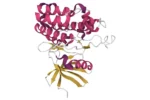What is Vasoactive Intestinal Polypeptide (VIP)?
Vasoactive Intestinal Polypeptide (VIP) belongs to a class of peptides called the neuropeptides. Neuropeptides are short sequence peptide chains produced by neurons that play a role as chemical messengers in various biochemical pathways.
The Vasoactive Intestinal Polypeptide is considered to be a potent vasodilator, by researchers studying the action of the peptide. It is also classified as a neuromodulator and a neurotransmitter. It appears to function in the gastrointestinal tract (GIT). Here, it may modulate the smooth muscle activity mainly by relaxation and regulates epithelial cell secretion and blood flow to the GIT. It appears to interact with other gut chemicals to optimize gut function. Researchers suppose that it acts in a paracrine manner, being released from nerve terminals and acting locally on the receptors specific to it. The VIP receptor belongs to the class of G-protein coupled receptors.
Research
Action of Vasoactive Intestinal Polypeptide in Colitis
The intestinal epithelial wall is constantly exposed to extremely harsh conditions due to the passage of partially digested food, bile, and other acids. Maintaining the ace of the intestinal epithelial wall’s integrity is essential in protecting the small bowel from various immune-modulated inflammatory disorders; the most prominent is the inflammatory bowel disease or IBD (also known as colitis). Extensive research has suggested that the enteric nervous system (ENS) includes the fibers of Vasoactive Intestinal Polypeptide-secreting nerves running through the lamina propria of the small intestine- plays an important and poorly understood role in the protection of the intestinal epithelium.
Research suggests that the disruption of the ENS during the pathogenesis of IBD may play a contributory role in the manifestation of the overt symptoms of IBD, including abdominal cramping and runny stool. Several notable studies have suggested a strong association between the significant decrease in the expression of Vasoactive Intestinal Polypeptide and VPA1C, its receptor, and IBD. These studies conclude that VIP may play a protective role against inflammatory bowel disorders like IBD by maintaining the integrity and homeostasis of the intestinal epithelial wall.
Bile Acid Secretion Through VIP
Studies suggest that Vasoactive Intestinal Polypeptide may cause an increase in bile acid secretion by the liver by enhancing the flow of bile and bile salt production. In studies conducted on duct-ligated rats, researchers noticed that exposure to exogenous VIP produced a significant increase in bile pH, bicarbonate concentration, and overall bile output in a concentration-dependent manner.
Vasoactive Intestinal Polypeptide appeared to case a significant stimulation of the cholangiocytes in the liver. This may induce an increase in fluid and bicarbonate secretion via a potent cAMP-independent pathway. The enhancement of bile secretion and output has been suggested via research findings that suggest the exogenous introduction of VIP in animal research models resulted in a massive increase in bile volume of up to 60%.
As a potential vasodilator, Vasoactive Intestinal Polypeptide appears to exert a similar action on the pancreatic vascular beds. Vasodilating the vessels that supply the pancreatic bed improves pancreatic secretory activity and enhances bile secretion. Therefore, Vasoactive Intestinal Polypeptide may potentially play a hemodynamic role and secretory role in the gut.
Goblet Cell Growth Via VIP
Goblet cells are a specialized type of mucosal cells in the intestinal epithelium that are the prime sites for mucosal absorption and digestion. Goblet cells are extensively present in large airways and the intestinal and colonic epithelium. In all these sites, it primarily functions to secrete mucous. Goblet cells produce the macro glycoprotein called mucin, the main component of mucous.
In the gut, goblet cells secrete a thick mucous coating that maintains intestinal epithelial homeostasis upon stimulation, either by exocytosis or acetylcholine. Therefore, goblet cells have a somewhat protective function. It has been suggested by research studies that goblet cells serve as antigen importers and regulate the innate immune system.
Research on the Vasoactive Intestinal Polypeptide has suggested that exposure to Vasoactive Intestinal Polypeptide resulted in a significant increase in the ileal concentrations of goblet cells in mice models aiding in the protection of the gut.
Gallbladder Relaxation via Vasoactive Intestinal Polypeptide
Immunohistochemistry analysis of the gallbladder indicated VIP-secreting nerve fibers in its wall. The control of gallbladder contraction and relaxation appears to be somewhat neurohumoral. It has been suggested that Vasoactive Intestinal Polypeptide secretion may result in a relaxation of the Sphincter of Oddi that permits and improves bile outflow.
Disclaimer: The products mentioned are not intended for human or animal consumption. Research chemicals are intended solely for laboratory experimentation and/or in-vitro testing. Bodily introduction of any sort is strictly prohibited by law. All purchases are limited to licensed researchers and/or qualified professionals. All information shared in this article is for educational purposes only.






